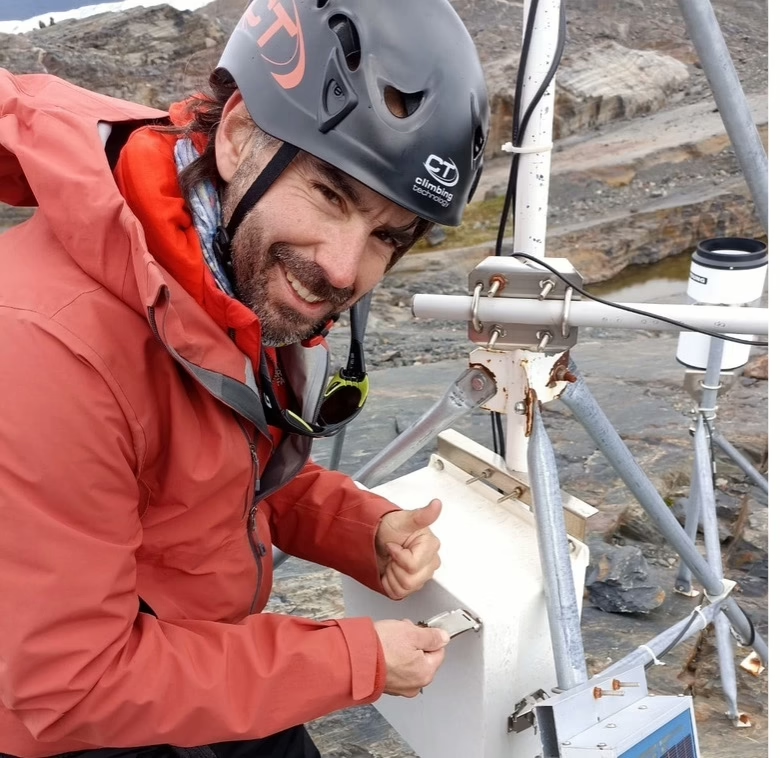Francisco Aguirre, PhD

Francisco Aguirre, PhD
Title
Location
Pronouns
Education
about
Faculty Profile
Francisco grew up in Central Chile, between the high Andes and agricultural fields, and his professional experience includes private companies, government agencies and research groups. For the last ten years, he has worked in Patagonia in collaboration with different interdisciplinary researchers and government institutions, examining the cryosphere and climate change.
Before joining SFS, Francisco implemented Long-Term Ecologic Network stations, measuring greenhouse gases (GHG) as a member of the Cape Horn International Centre (CHIC) of the Universidad de Magallanes (UMAG). These stations evaluate ongoing changes in the region’s hydroclimatic systems as well as Patagonian environmental responses. Francisco also was part of the Centro de Investigación Gaia Antártica (CIGA) of UMAG, working as postdoctoral researcher in the project “Development of a prototype alert system to reduce the impact of glacier-related flood events (SAGAZ)”. Currently collaborates with INACH (Chilean Antarctic Institute) as a Researcher in understanding climate variability and its impacts on both glaciers and snow season in Patagonia.
Francisco is a civil engineer, geographer, practitioner of the path of Karate-Do and mountain climber who is passionate about science in Patagonia.
Academics & Research
Research Interests
Francisco received his PhD from the Universidad de Magallanes, a local University, where he studied in an interdisciplinary program in Antarctic and Subantarctic Science, in which he focused on glaciology and climatology, and their interactions with terrestrial ecosystems in southern Patagonia.
Much of his research examines questions of glaciology and hydro climatology in various environmental contexts. He also likes to review and validate new methods and their implementation to evaluate hydroclimatic variability and impacts on atmosphere-cryosphere interactions.
Professional Affiliations
outputs
Publications
Aguirre, F., Bozkurt, D., Sauter, T., Carrasco, J., Schneider, C., Jaña, R., & Casassa, G. (2023). Remote Sensing, 15(22), 5430.
Thalasso, F., Riquelme, B., Gómez, A., Mackenzie, R., Aguirre, F. J., Hoyos-Santillan, J., … & Sepulveda-Jauregui, A. (2023). Biogeosciences Discussions, 2023, 1-19.
Salas-Rabaza, J. A., Andrade, J. L., Us-Santamaría, R., Morales-Rico, P., Mayora, G., Aguirre, F. J., … & Thalasso, F. (2023). Science of The Total Environment, 904, 166358.
Sandvig, E. M., Quilodrán, C. S., Altamirano, T. A., Aguirre, F., Barroso, O., Rivero de Aguilar, J., … & Rozzi, R. (2023). Ecology and Evolution, 13(6), e10143
Quilodrán, C. S., Sandvig, E. M., Aguirre, F., de Aguilar, J. R., Barroso, O., Vásquez, R. A., & Rozzi, R. (2022). Biodiversity and Conservation, 1-15.
Aguirre, F., Squeo, F. A., López, D., Buma, B., Carvajal, D., Jaña, R., … & Rozzi, R. (2021). In Anales del Instituto de la Patagonia (Vol. 49). Universidad de Magallanes.
Etayo, J., Sancho, L. G., Gómez-Bolea, A., Sochting, U., Aguirre, F., & Rozzi, R. (2021). Anales del Instituto de la Patagonia, 2021, vol. 49, p. 1-110.
Sandvig, E., Quilodrán, C. S., Aguirre, F., de Aguilar, J. R., Barroso, O., Vásquez, R. A., & Rozzi, R. (2020). In Anales del Instituto de la Patagonia (Vol. 48, No. 3, pp. 169-183). Universidad de Magallanes.
Rozzi, R., Grego, R. D., Contador, T., Schüttler, E., Rosenfeld, S., Mackenzie, R., … & Massardo, F. (2020). In Anales del Instituto de la Patagonia (Vol. 48, No. 3, pp. 45-81). Universidad de Magallanes.
Aguirre F, Carrasco J, Sauter T, Schneider C, Gaete K, Garín E, Adaros R, Butorovic N, Jaña R and Casassa G (2018) Front. Earth Sci. 6:130. doi: 10.3389/feart.2018.00130.
Grants and Awards
2022: Researcher: InES I+D / UMAG: Sci-Hub Austral: Implementation and strengthening of enabling capacities for the innovation andentrepreneurship ecosystem in the Antarctic and Subantarctic context “ANID.
2021: Researcher: Basal Fund Research Centers of Excellence / UMAG: Cape Horn International Center (CHIC). ANID
2021: Researcher: NODE / UMAG: Subantarctic Natural Laboratories Node.
2021: Researcher: Institutional Strengthening Fund: Strengthening Research on Climate Change and Antarctic and Subantarctic Conservation. Antarctic and Sub-Antarctic Conservation and Climate Change Research. MINEDUC
2020: PI: FONDEQUIP / IEB: Carbon, methane and other greenhouse gas monitoring network in the world’s southernmost forests and peatlands. ANID